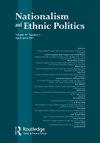Grievances, Policies or Clientelism? The Different Logics behind Ethnic Voting in Democracies and Autocracies
IF 1.1
Q3 ETHNIC STUDIES
引用次数: 0
Abstract
Abstract In this article, we explore the reasons why some ethnic groups tend to vote along ethnic lines while others do not. We argue that existing explanations for ethnic voting can be grouped into three main approaches: policy-based, grievance-based, and clientelism. However, we contend that inconsistencies in previous empirical research come from a failure to account for the political context in which ethnic voting occurs. Specifically, we argue that ethnic voting in democracies operates on a different logic than in non-democratic regimes. Our argument posits that policy- and grievance-based factors are the primary determinants of ethnic voting in democracies, whereas clientelist networks play a crucial role in understanding ethnic voting in autocratic regimes. To test our hypotheses, we use a sample of 428 ethnic groups from 33 African countries between 2005 and 2018, as well as a novel survey-based measurement of voting preferences among ethnic group members. Our findings support our hypotheses: in democratic regimes, grievance-based and policy-based explanations have strong explanatory power, whereas clientelism is the primary driver of ethnic bloc voting in autocracies. We conclude that both regime type and the different underlying mechanisms of clientelism require greater consideration in the research on ethnic voting.不满、政策还是庇护主义?民主政体与专制政体中族群投票背后的不同逻辑
在这篇文章中,我们探讨了为什么一些民族倾向于沿着民族界线投票,而另一些民族则不这样做。我们认为,对民族投票的现有解释可以分为三种主要方法:基于政策的、基于不满的和裙带主义的。然而,我们认为,以往实证研究的不一致性来自于未能考虑种族投票发生的政治背景。具体来说,我们认为民主国家的民族投票运作的逻辑与非民主国家不同。我们的论点认为,基于政策和不满的因素是民主国家民族选举的主要决定因素,而客户网络在理解专制政权的民族选举中起着至关重要的作用。为了验证我们的假设,我们使用了2005年至2018年间来自33个非洲国家的428个种族群体的样本,以及一种基于调查的新的种族群体成员投票偏好测量方法。我们的研究结果支持了我们的假设:在民主政体中,基于不满和基于政策的解释具有很强的解释力,而在专制政体中,庇护主义是种族集团投票的主要驱动因素。我们的结论是,在民族选举研究中,无论是政权类型还是亲信主义的不同潜在机制都需要更多的考虑。
本文章由计算机程序翻译,如有差异,请以英文原文为准。
求助全文
约1分钟内获得全文
求助全文
来源期刊

Nationalism and Ethnic Politics
ETHNIC STUDIES-
CiteScore
1.30
自引率
0.00%
发文量
30
期刊介绍:
Nationalism & Ethnic Politics explores the varied political aspects of nationalism and ethnicity in order to develop more constructive inter-group relations. The journal publishes case studies and comparative and theoretical analyses. It deals with pluralism, ethno-nationalism, irredentism, separatism, and related phenomena, and examines processes and theories of ethnic identity formation, mobilization, conflict and accommodation in the context of political development and "nation-building". The journal compares and contrasts state and community claims, and deal with such factors as citizenship, race, religion, economic development, immigration, language, and the international environment.
 求助内容:
求助内容: 应助结果提醒方式:
应助结果提醒方式:


